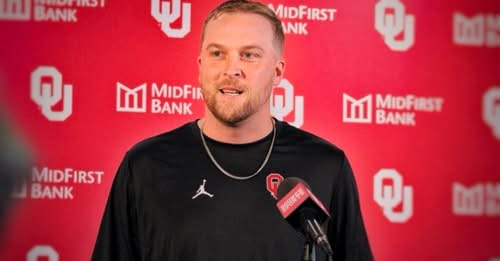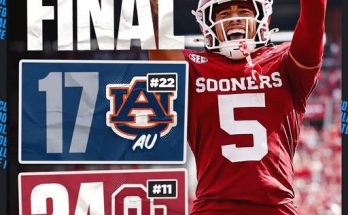Canadian graduate and Oklahoma offensive coordinator Ben Arbuckle met with the media during a press conference Wednesday to discuss the upcoming 2025 football season, and what followed was a surprisingly thoughtful and layered breakdown of not only the Sooners’ offensive philosophy, but also Arbuckle’s own journey through football, coaching, and personal evolution. This wasn’t your typical pre-season presser, where coaches toss out vague platitudes and hopeful projections. Instead, Arbuckle opened up about the pressure of leading one of the most scrutinized programs in college football, the responsibility he feels stepping into a position previously held by some of the brightest minds in the game, and the bold vision he has for a Sooners offense that’s looking to rewrite the script following an inconsistent 2024 campaign. The tone of the presser was direct yet reflective, filled with moments that gave insight into Arbuckle’s leadership style and football intellect. It was clear from the start that Arbuckle was not there to entertain clichés or avoid tough questions. He made it known that his hiring was not just a career move—it was a personal mission. Coming from a background that includes stops at Houston Baptist, Western Kentucky, and most recently as co-offensive coordinator at Washington State, Arbuckle has always been regarded as one of the most analytically forward, aggressively minded young coaches in the country. But as he explained, landing the job at Oklahoma came with more emotional weight than he anticipated.
He referenced growing up in Canada and dreaming about football in the American south—not exactly the easiest pipeline for success in a sport where connections, regional loyalties, and SEC or Big 12 pedigree often determine opportunities. He shared that his path was “unorthodox and mostly uphill,” but that the struggles gave him the kind of mental endurance that makes him comfortable in the firestorm that is Oklahoma football. As the press conference progressed, reporters honed in on what exactly Arbuckle intends to implement schematically this fall. The Sooners were electric in spurts last season but lacked consistency in the red zone, often stalling drives and failing to execute in high-leverage moments. Arbuckle didn’t flinch when addressing the shortcomings. He acknowledged the issues as both structural and psychological. “We didn’t finish last year,” he admitted. “That’s not something I’m going to sugarcoat. Whether it was play design, player confidence, or flat-out bad execution, we weren’t where we needed to be when it counted.” Then came the key shift in his message—Arbuckle wasn’t interested in replicating last season’s blueprint. He made it clear that the 2025 Sooners will have a new identity, one built on spacing, tempo, and aggression. “You’ll see us push the boundaries on first down. We’re not playing safe, we’re playing smart. And sometimes that means going for the jugular early in the drive,” he said, emphasizing that fear of mistakes has no place in his offense. That line—“fear of mistakes has no place in this offense”—resonated across the room, especially considering the Sooners’ tendency to get conservative late in games last year.
He also discussed how his quarterbacks would be coached to understand leverage, spatial control, and defensive tendencies at a level that he says “rivals what’s expected of NFL signal-callers.” Arbuckle’s vision goes beyond Xs and Os. He wants his players to understand the ‘why’ behind every read and every audible. “The best quarterbacks aren’t just talented. They’re relentless in their preparation. I’m not interested in grooming a highlight reel player. I’m grooming a field general,” he said. All eyes are on redshirt sophomore quarterback Treyson Walker, who is expected to be the starter after a competitive spring camp. Arbuckle expressed confidence in Walker’s ability to take ownership of the offense, while also noting that the team would adjust its play-calling to suit his skill set. “We’re not fitting a player into a system. We’re building a system around the player,” he added, reinforcing his adaptable approach. Walker’s mobility and poise under pressure have given Arbuckle reason to believe the Sooners could quietly become one of the nation’s most balanced attacks, even with a relatively young offensive line. Arbuckle was asked about concerns surrounding the offensive line’s inexperience and whether that could jeopardize some of his more aggressive play designs. He didn’t dodge the question. Instead, he addressed the unit’s development head-on. “We’ve got youth, but we’ve also got hunger,” he said. “It’s easier to coach up guys who haven’t been scarred by losing. These kids believe in each other, and that’s a big deal.” He added that they’ve implemented a heavy rotation in practice to foster chemistry among different combinations and reduce the risk of communication breakdowns once the season begins.
One of the more emotionally resonant parts of the press conference came when Arbuckle reflected on what it meant to him to lead an American college football team as someone who was born and raised outside of the traditional football hotbeds. “When you grow up watching Oklahoma football from the outside, it feels like a myth. Now that I’m here, wearing the crimson and cream, I realize the myth is built by real people who care deeply. Coaches, fans, players—this place has a soul, and I don’t take that lightly.” His words clearly struck a chord, and for a brief moment, the media room felt less like a press obligation and more like a storytelling session from a man who knows he’s writing the next chapter of something much bigger than himself. Arbuckle didn’t hold back when asked about the pressure from fans and boosters, which has historically been a defining force at Oklahoma. “Pressure’s real, but pressure also means people care,” he said. “I’d be more worried if no one was watching.” He shared how he’s been studying the legacy of former Sooner offensive coordinators—guys like Kevin Wilson, Lincoln Riley, and Jeff Lebby—not to copy their work, but to understand how they managed expectations while innovating. Arbuckle made it a point to say he wants to innovate within the culture, not against it. “I’m not here to be a disruptor for the sake of being different. I’m here to be effective. We want to play modern football, but that doesn’t mean we forget who we are.”
Recruiting was another hot topic, and Arbuckle emphasized that he’s looking for “mentally tough competitors” who aren’t just athletic, but also coachable. He described his ideal player as someone who’s “obsessed with detail, allergic to excuses.” He gave a brief story about visiting a 4-star recruit’s home earlier in the summer and noticing the young man had whiteboards full of play concepts in his room. “That’s the kind of hunger you can’t fake,” Arbuckle said. “He didn’t even know I was coming that day. That was just how he lived.” Moments like these showed how Arbuckle’s philosophy is rooted as much in human behavior as it is in analytics or film study. When discussing how NIL and the transfer portal have changed the nature of his job, Arbuckle took a balanced view. “The game’s changing, but so is life. You either evolve or you get left behind,” he said. He acknowledged that building team chemistry has become more complex, but also more urgent. “We can’t afford to wait until week five to find out who we are. Our job is to get aligned—fast.” Arbuckle said he’s installed weekly leadership meetings where players from every position group are encouraged to give feedback not just on the game plan, but also on team dynamics and locker room culture. “We don’t want surface-level chemistry,” he said. “We want trust. And trust comes from accountability.”
The press conference closed with Arbuckle being asked what his goals were for the 2025 season. Without hesitation, he answered, “Dominate.” There was no lengthy explanation, no hedging. Just one word that encapsulated everything he’d spent the past 40 minutes explaining. And yet, when he elaborated, it was clear that domination meant more than just wins and losses. “We want to dominate our habits, dominate our preparation, dominate the mental side of the game. If we do those things, the scoreboard will take care of itself.” It’s rare for a coordinator’s introductory press conference to feel like a cultural manifesto, but that’s exactly what Arbuckle delivered. The message was clear: Oklahoma’s offense isn’t just going to be different in 2025. It’s going to be fearless, thoughtful, and uniquely shaped by a coach who knows what it’s like to come from outside the circle and earn your place inside it. With Ben Arbuckle calling the shots, the Sooners aren’t just preparing for another season. They’re preparing for a transformation—one that begins with belief, is powered by preparation, and will ultimately be measured by execution. Whether or not they reach the College Football Playoff remains to be seen, but for the first time in a while, it feels like Oklahoma’s offensive engine has a visionary at the wheel.



